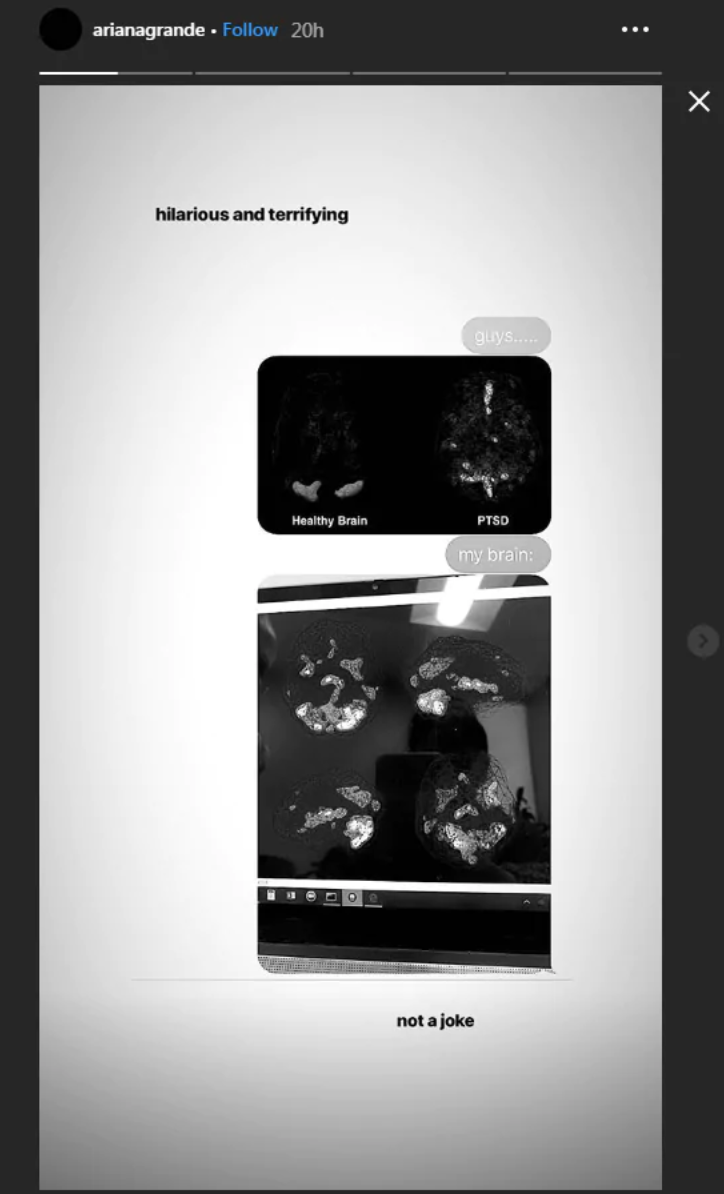Singer-songwriter Ariana Grande has posted images on Instagram showing what she suggests is a scan of her brain after a battle with post-traumatic stress disorder.
Grande, who has been open about how she has struggled with PTSD symptoms since a 2017 attack at her concert in Manchester, England, shared her brain scans Thursday in Instagram Stories.
One photo showed what she said was a healthy brain compared with a brain with PTSD, and then she posted another image showing her own brain.
"Hilarious and terrifying," Grande wrote.
She added that the images were "not a joke."
 (Ariana Grande/Ariana Grande)
(Ariana Grande/Ariana Grande)
A representative for Grande could not immediately be reached for comment by The Washington Post.
PTSD is a mental health condition that can develop after a traumatic event, such as a mass shooting, and include symptoms ranging from flashbacks to the event to nightmares to severe anxiety and panic attacks, according to the Mayo Clinic.
Doctors diagnose the disorder through a physical exam and psychological evaluation, Mayo said, and treatment typically involves certain types of psychotherapy.
Susan Bookheimer, a professor of cognitive neuroscience at the University of California at Los Angeles's medical school, said that low-resolution scans like the one that Grande appeared to share cannot diagnose or show symptoms of PTSD.
"If one studies a large group of individuals with PTSD and compares them with those without trauma using a much higher resolution brain scanning technique such as functional MRI at 3 Tesla, or possibly PET with a sensitive new radioligand, one may see brain differences at the group level," she wrote in an email to The Post.
"But without diminishing the truly awful events that she experienced, and those of the many individuals with PTSD experience, the changes that occur in the brain are far too subtle to be imaged using today's techniques, and especially SPECT if that is what this is, even though there are practitioners out there who will make such claims (and often, will charge a lot of money). There is no FDA-approved imaging technique for diagnosis or revelation of PTSD, and nothing similar in the UK."
Grande had performed a concert May 22, 2017, at the Manchester Arena. As fans were leaving, a suicide bomber killed nearly two dozen people and injured numerous others.
In a cover interview last year with British Vogue, Grande opened up about the attack and her symptoms of PTSD.
"It's hard to talk about because so many people have suffered such severe, tremendous loss. But, yeah, it's a real thing," she told the magazine.
"I know those families and my fans, and everyone there experienced a tremendous amount of it as well. Time is the biggest thing. I feel like I shouldn't even be talking about my own experience — like I shouldn't even say anything. I don't think I'll ever know how to talk about it and not cry."
Eli Rosenberg contributed to this report.
2019 © The Washington Post
This article was originally published by The Washington Post.
